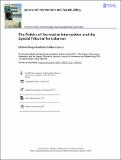Files in this item
The politics of normative intervention and the Special Tribunal for Lebanon
Item metadata
| dc.contributor.author | Burgis-Kasthala , Michelle | |
| dc.contributor.author | Saouli, Adham | |
| dc.date.accessioned | 2021-09-14T20:30:29Z | |
| dc.date.available | 2021-09-14T20:30:29Z | |
| dc.date.issued | 2022 | |
| dc.identifier | 275056217 | |
| dc.identifier | 55bf61a5-e049-45ab-944f-70e84a52c109 | |
| dc.identifier | 000695154700001 | |
| dc.identifier | 85114831063 | |
| dc.identifier.citation | Burgis-Kasthala , M & Saouli , A 2022 , ' The politics of normative intervention and the Special Tribunal for Lebanon ' , Journal of Intervention and Statebuilding , vol. 16 , no. 1 , pp. 79-97 . https://doi.org/10.1080/17502977.2021.1961509 | en |
| dc.identifier.issn | 1750-2977 | |
| dc.identifier.other | ORCID: /0000-0002-4118-2627/work/100172581 | |
| dc.identifier.uri | https://hdl.handle.net/10023/23959 | |
| dc.description | Part of this research was funded by the Australian Research Council. | en |
| dc.description.abstract | Lebanon's turbulent history has seen many political assassinations, but only one, the assassination of PM Rafic Hariri, led to the establishment of an international tribunal – The Special Tribunal for Lebanon (STL) – in 2009. Why was the STL created? This study suggests that the creation of the STL constituted a ‘normative intervention': purposeful attempts by domestic and international actors to transmit norms and institutions to a country to realize political goals. Normative interventions, particularly in divided societies, trigger ‘normative contestations’, which are shaped by the identities and interests of various actors. The result reveals that normative interventions deepen existing political cleavages. | |
| dc.format.extent | 19 | |
| dc.format.extent | 1631285 | |
| dc.language.iso | eng | |
| dc.relation.ispartof | Journal of Intervention and Statebuilding | en |
| dc.subject | Special Tribunal for Lebanon (STL) | en |
| dc.subject | Lebanon | en |
| dc.subject | Hizbullah | en |
| dc.subject | Normative intervention | en |
| dc.subject | Assasination | en |
| dc.subject | JZ International relations | en |
| dc.subject | T-NDAS | en |
| dc.subject.lcc | JZ | en |
| dc.title | The politics of normative intervention and the Special Tribunal for Lebanon | en |
| dc.type | Journal article | en |
| dc.contributor.institution | University of St Andrews. School of International Relations | en |
| dc.identifier.doi | https://doi.org/10.1080/17502977.2021.1961509 | |
| dc.description.status | Peer reviewed | en |
| dc.date.embargoedUntil | 2021-09-12 |
This item appears in the following Collection(s)
Items in the St Andrews Research Repository are protected by copyright, with all rights reserved, unless otherwise indicated.

